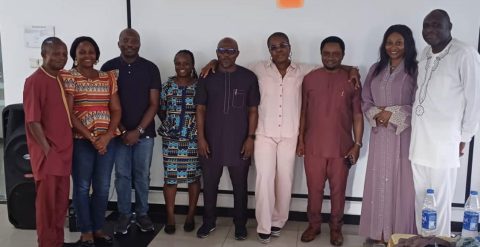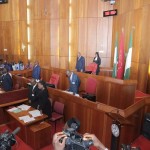Analysis – WASH Policy: Making Robust Input In Alignment With African Sanitation Policy
Articles/Opinion, Featured, Latest Headlines, News Features/Analysis Sunday, June 23rd, 2024
(AFRICAN EXAMINER) – Health, they say, is wealth! Just as a clean environment promotes Healthy living. However, there is no gain saying the fact that a high number of human lives are lost annually across the globe, including sub Saharan Africa, Nigeria inclusive, owing to poor sanitation and hygiene related issues within the human environment.
A recent statistics by the World Health Organization WHO, on Water Sanitation and hygiene (WASH) related burden of disease, revealed that an estimated 1.4 million people die each year as a result of inadequate drinking water.
Similarly, UNICEF, in its report in 2023, revealed that 829,000 people die from diseases directly attributable to unsafe water, inadequate sanitation, and poor hygiene.
It is against the backdrop of mitigating the impending dangers associated with WASH that relevant world and continental bodies from time to time formulate policies and Guidelines for nation’s within its jurisdictions with a view to addressing such challenges and also make them key into the WASH global best practices.
For Africans, including Nigeria, the African Sanitation Policy Guideline (ASPG) was developed as a guideline for African member states for adaptation for inclusive sanitation policies.
The context in Nigeria existing challenges in Water, Sanitation and Hygiene (WASH), reveal notable gaps, particularly concerning the overlapping responsibilities between waste
management and pollution control under the various agencies at both Federal and State levels.
Also, the intricacy further compounded by the nationwide drive to eliminate open defecation led by the Federal Ministry of Water Resources (FMWR), resulting in distinct national policies for Environmental Sanitation and Water Sanitation and a proliferation of guidelines, roles, and responsibilities across multiple agencies.
These Identified gaps, no doubt needs to be addressed comprehensively as the nation commence a shift from basic to safely managed sanitation (SMS).
In Enugu State, South East Nigeria, through Technical support from WaterAid, the coal city state as it’s fondly called, has developed a draft WASH policy in line with the ASPG, and to further support the ongoing process of the policy development in the state, the organization, recently brought together key Stakeholders in the WASH sector of the state under one roof for a 2-day training workshop.
According to the donor agency, the workshop was aimed at deepening understanding and integration of concrete gender issues like gender roles, participation, access, decision-making, intra-household dynamics, sex and age disaggregated data for the different sectorial interventions or issues.
The training which took place between Thursday, 13th, and Friday 14, June 2024 at Hotel Sunshine Enugu, equally helped in providing vital information regarding the protection issues facing men, women, boys and girls that will affect WASH programming and operations in the state.
The 2- day support training by WaterAid, Nigeria was put together in collaboration with the Bill and Melinda Gates Foundation and the Enugu State Ministry of Water Resources, and was designed as part of measure to make the state align itself with the African Sanitation Policy Guideline(ASPG).
Conversations during the workshop centered on areas such as the ASPG, safely managed sanitation, mapping safely managed sanitation – Actors and actions, presentation of the policy improvement plan from WASH situation assessment, Enugu Fecal Sludge management, amongst others.
The participants, engaged in the workshop are known as members of Citizen led groups drawn from people living with Disabilities, Women organizations, who are WASH key Stakeholders that are often forgotten and neglected when policy reviews are taking place.
During the training, participants reflected elaborately on the
Draft Enugu State WASH Policy in line with the African Sanitation Policy Guideline (ASPG).
For easy conversation, Stakeholders in the state had put in place Water, Sanitation, and Hygiene (WASH) sector coordination platform, a Meeting platform of Critical and relevant WASH Stakeholders where burning issues of the sector in the State are discussed and shared with the government for further action and directive.
The WASH sector Coordination platform is headed by the state Commissioner,
Ministry of Water Resources, who may delegate the power of overseeing the functionality of the platform to any of his/her subordinates.
Members of the platform includes all line Ministries, Departments and Agencies (MDAs) with WASH-related functions/roles, development partners supporting the state in the area of WASH, Civil Society organizations CSOs, Non governmental organizations NGOs, and private investors in the state WASH sector.
In a goodwill massage, the Enugu state Commissioner for Water Resources, Dr. Felix Nnamani, represented by Mr. Christopher Ogbu, Coordinator, Enugu state Small Towns Water Supply and Sanitation Agency, expressed appreciation to WaterAid for it’s technical supports to the state.
He assured the Stakeholders of the Enugu state government’s commitment through his Ministry’s in puting in place a people’s oriented WASH policy in line with the continental policy.
Also in their separate remarks, Commissioners for Health, represented by the Permanent Secretary in the Ministry, Dr. Chinwe Anibueze, that of Ministry of Children, Gender Affairs, and social Development, Mrs. Ngozi Enih, represented by the Clinical Psychologist in the Ministry, Chisom Udoye, poured encomium on WaterAid for all it has been doing for the state in area of WASH, describing the organization as a worthy and reliable partner.
Explaining to the participants objective of the training workshop, the state programme lead of Wateraid, Mr. Solomon Akpanufot, said the programme, was designed to deepen participants understanding of the ASPG’s policy process, and also to trigger discussions around the shift from basic sanitation to Safely Managed
Sanitation (SMS).
He added that it was also aimed at further engaging women and vulnerable groups to make input to the ongoing
process of developing the Enugu State WASH Policy, stressing that the workshop would equally deepen understanding and integration of concrete gender and protection issues
into the policy development process, as well as help in the development of a sanitation advocacy plan.
After giving an overview of the ASPGs during a presentation, Head, of Advocacy, policy and Communications, WaterAid, Mr.Kolawole Banwo, said in an interview with newsmen that we have come to engage a group of people we call Citizen les groups. These are made up of Women groups, people living with disabilities, and these are Stakeholders that are often being forgotten and neglected when talking of policy review, whereas, they suppose to be involved in such exercise.
“So, we felt we owe them a duty to bring them together and let them know that the policy review process is on, and that they have a voice. And we want to also let them understand what safely managed sanitation is all about which is the way the world is going now from what we use to practice. And this is aimed at ending open defecation”
In her presentation, the Advocacy and policy Manager, WaterAid Mrs. Theodora Igboaruka, took the participants on
safely managed sanitation processes.
In a Communique issued at the end of the workshop, participants observed that Enugu State in the past prioritized water supply but has always down played sanitation and hygiene especially as it concerns Fecal sludge management and safely managed Sanitation.
They noted that according to the WASH National Outcome Routine Mapping (WASHNORM) 2021, Enugu State is at 48% open defecation status, pointing out that almost half of the total population
and sanitation coverage (basic sanitation) is just 28%.
The participants equally observed that the lack of Fecal sludge treatment plants in the state has led to incessant dumping of fecal waste along Ugwuaji in Enugu South Council area of the state which they stressed has in the past caused harmful
effects to human and environmental health.
Also, the stakeholders observed that the lack of a functional WASH coordination forum in the state has mitigated adequate accountability, activity monitoring and sustainability of WASH interventions in the State.
The WASH Stakeholders, further identified the lack of approved WASH policy and State Open defecation ODF Roadmap as a challenge to the achievement of Sustainable Development Goals SDG 6 in the state come the year 2030.
The State Governor, Dr. Peter Mbah, was lauded by the participants for what the described as his visionary leadership and strong political will to WASH governance in the state.
They also congratulated the state government and the leadership of various WASH MDAs in the state on noticeable breakthroughs in the Enugu State WASH sector such as Improved water supply to Enugu Metropolis within the first 180 days of the present administration, Executive Order 006, the passage of Bye-laws against Open Defecation in the 17 Council areas of the state, as well as the categorization
of Water Tanker trucks in the state.
The Stakeholders in the Communique jointly signed by the State Ministry of Water Resources, State Ministry of Children, Gender Affairs and Social Development and Joint Association of people living with disability JONAPWD Enugu State Chapter,
Appealed to the state Ministry of Water Resources to prioritize the development and passage of the Enugu State ODF Roadmap, and WASH policy
to set direction and strategy for the attainment of SDGs 6 in the State.
Also, they opined that the State Ministry of Environment should liaise with key stakeholders to develop, validate, and disseminate a guideline for WASH facilities standards, technology, and designs in the state.
They equally harped on the need for stronger synergy and collaboration between the private sector
and the state government in Waste for Wealth development.
“The State government through its policies and regulations should create an Enabling environment for investors in waste-to-wealth. The government should de-risk investments in the state WASH sector.
“The government should galvanize Civil Society Organizations, Development
Partners and the private sector to implement projects along the fecal sludge value
chain.
Further more, “The state government, through its Ministry of Environment,should employ Environmental Health Officers(EHOs)in the State and LGAs as the last set of
EHOs recruited in the state will be retiring in 2025.
“The WASH Sector Coordination platform should be formalized with clear Terms
of Reference by the government. And that her secretariat should be domiciled at the Ministry of Water Resources with the Permanent Secretary or a senior officer of the Ministry appointed to coordinate and report on the activities of the platform while political appointees strengthen and support the platform to function effectively.
“In line with the vision of the state governor to reposition the WASH sector for efficient service delivery, critical meetings of WASH stakeholders should be attended by high-level executives and government stakeholders
(Commissioners, Permanent Secretaries), and not their representatives.
The Communique also expressed appreciation to participants from
Enugu State Ministry of Water Resources, Enugu State Ministry of Children, Gender Affairs and Social Development, State Economic Planning Commission, Enugu State Universal Basic Education Board (ENSUBEB), the Special Adviser SPA to the state Governor on Donor Relations, Mr. Anthony Dubem Oyia (Jr). SSA to the Governor on WASH.
Other Stakeholders appreciated in the Communique are, Ogechi Enwelum, Enugu State Coordinator –Society for Water and Sanitation (NEWSAN), Joint Association of Persons with Disability (JONAPWD), Dr. Olachi Chuks-Ronnie –Southern Nigeria Regional Coordinator, FCDO,
Bolatito Gabriel –UNICEF WASH Specialist, Enugu field office, Market Women Association Institute for Development Studies,University of Nigeria, Enugu Campus, Ambassador. Amaka Nweke of Network of Water Rights Initiative (NEWARI), Prof. Obioma Nworgu of Global Health Awareness and Research Foundation (GHARF), South Saharan Social Development Organization, WaterAid Nigeria and the Media.
Related Posts
Short URL: https://www.africanexaminer.com/?p=96432






















